Unit 6 Earth first Using language课件(共40张PPT)高中英语外研版(2019)必修第二册
文档属性
| 名称 | Unit 6 Earth first Using language课件(共40张PPT)高中英语外研版(2019)必修第二册 | 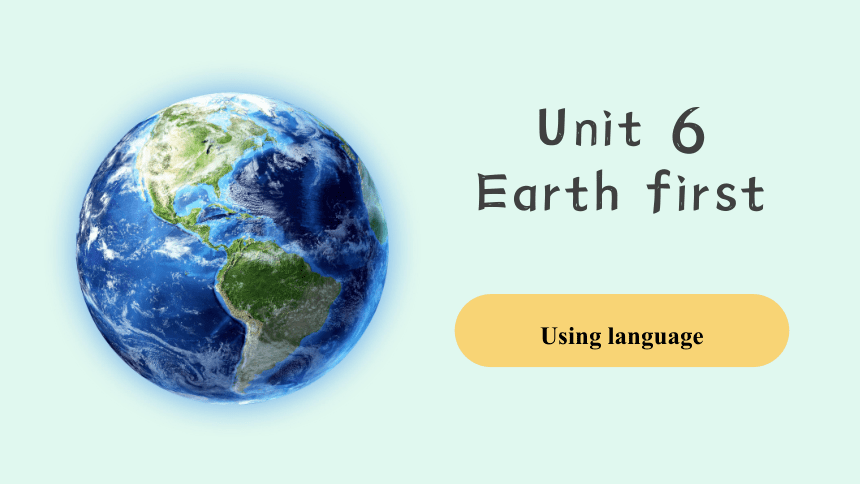 | |
| 格式 | pptx | ||
| 文件大小 | 64.6MB | ||
| 资源类型 | 教案 | ||
| 版本资源 | 外研版(2019) | ||
| 科目 | 英语 | ||
| 更新时间 | 2025-08-01 10:59:37 | ||
图片预览

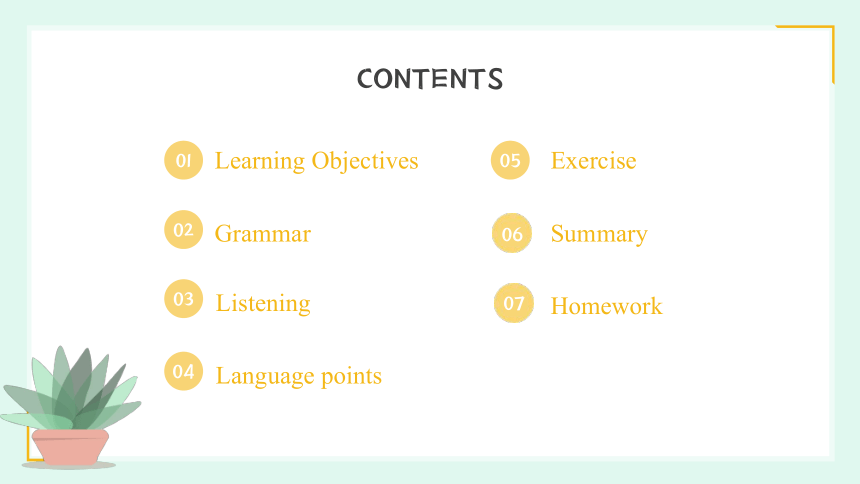
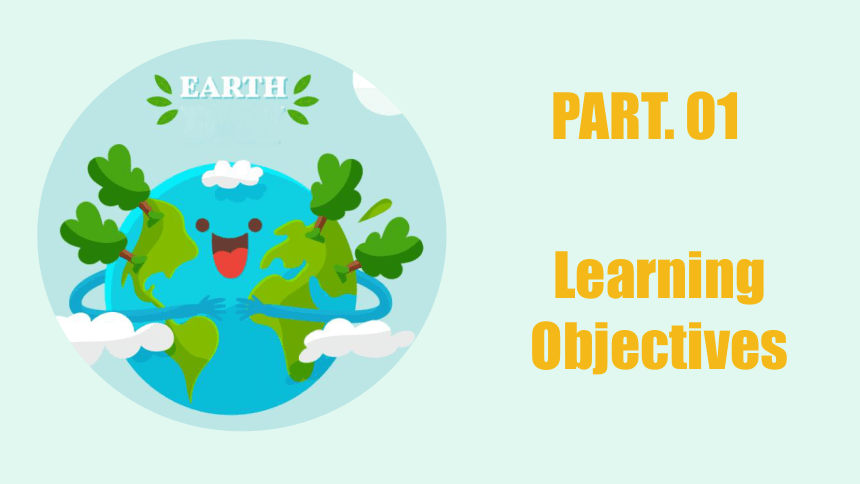
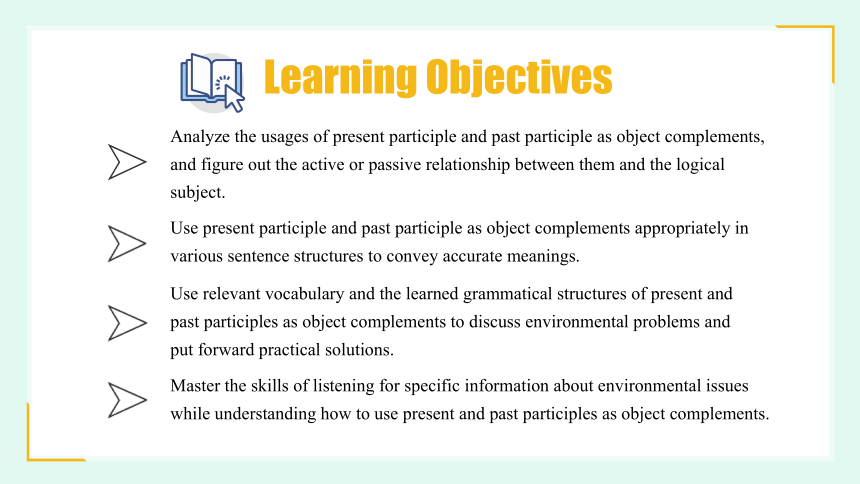
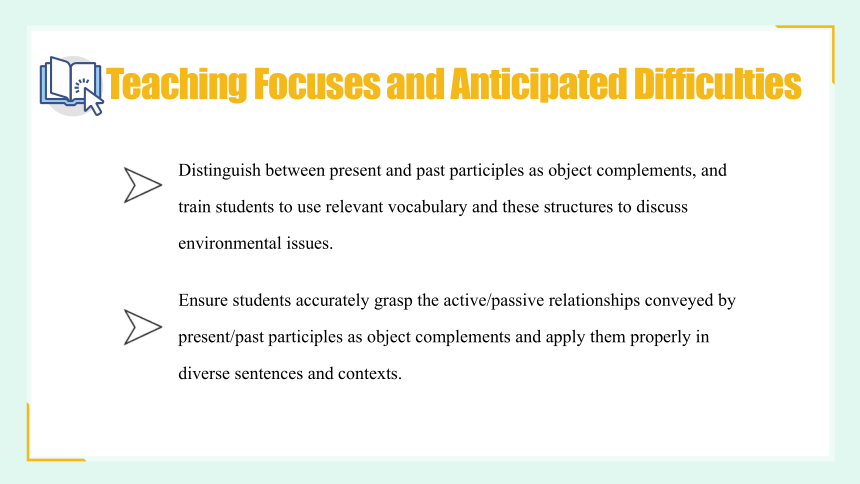
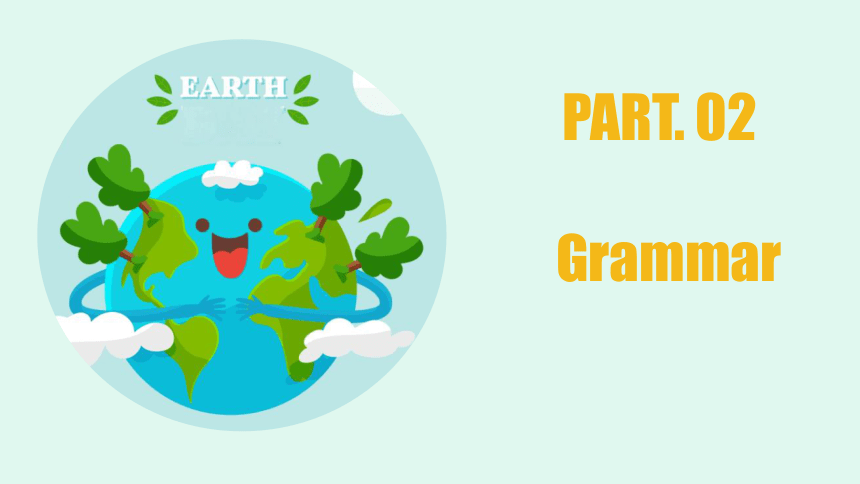
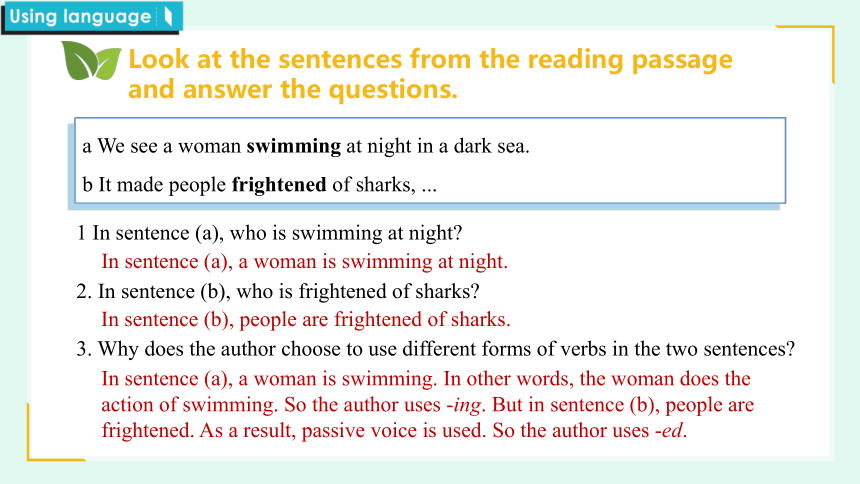
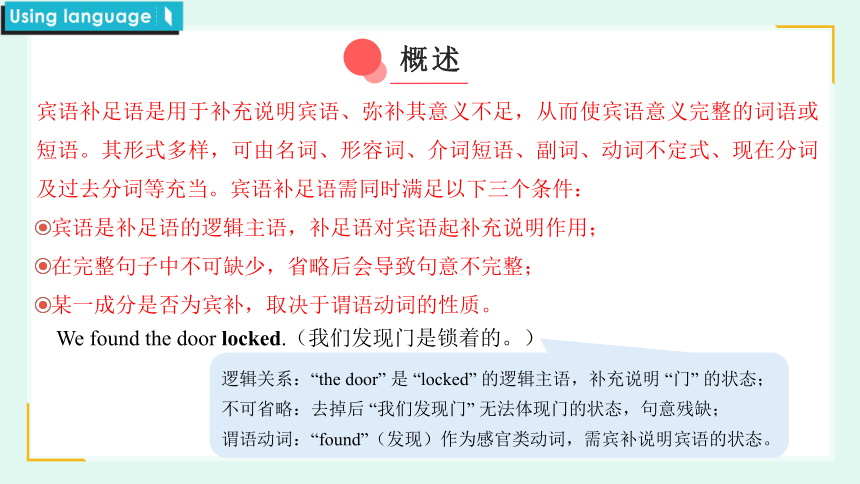
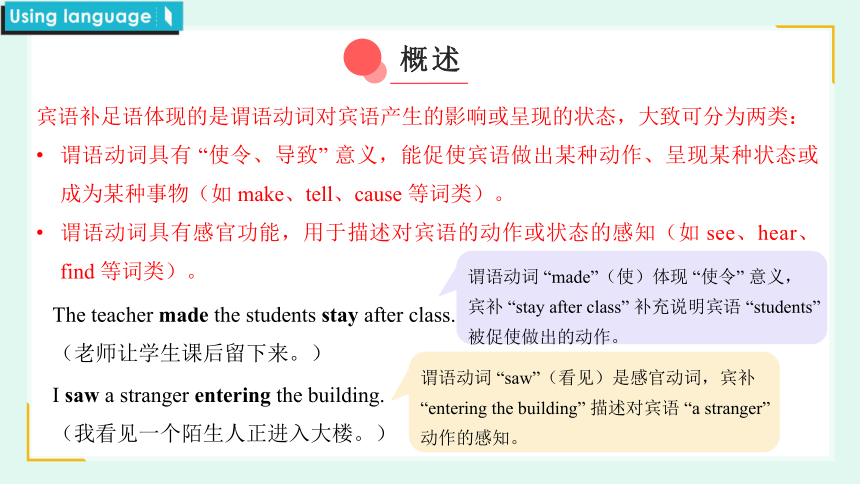
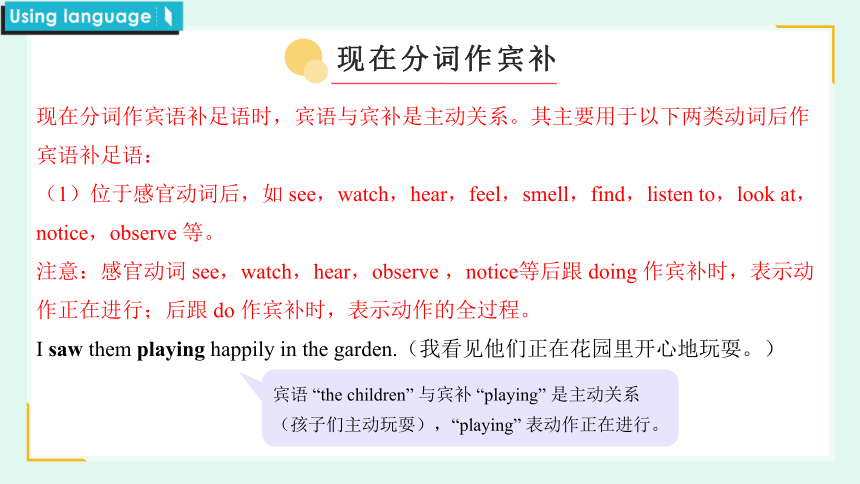
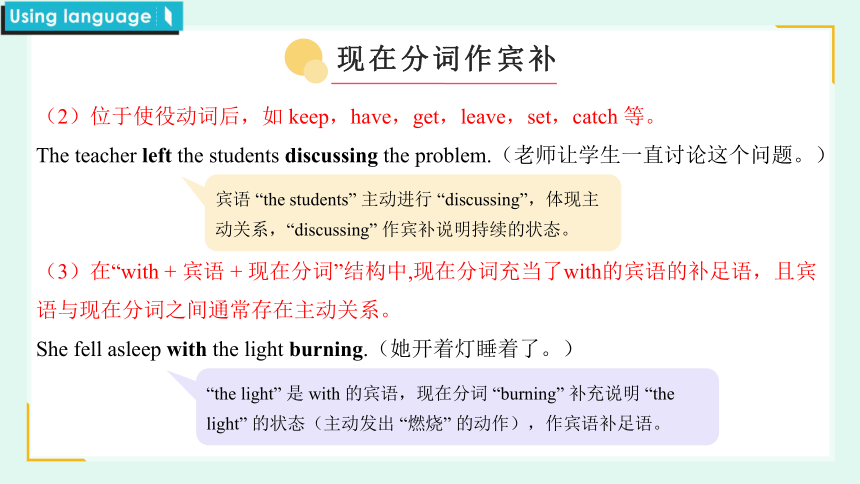
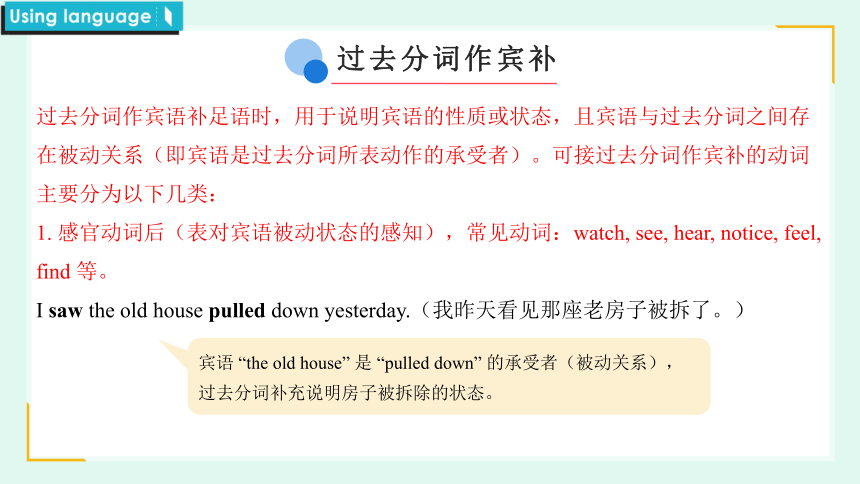
文档简介
(共40张PPT)
Using language
Unit 6
Earth first
CONTENTS
01
Grammar
02
03
Exercise
05
Learning Objectives
Listening
06
Summary
07
Homework
04
Language points
Learning Objectives
PART. 01
Learning Objectives
Analyze the usages of present participle and past participle as object complements, and figure out the active or passive relationship between them and the logical subject.
Use present participle and past participle as object complements appropriately in various sentence structures to convey accurate meanings.
Use relevant vocabulary and the learned grammatical structures of present and past participles as object complements to discuss environmental problems and put forward practical solutions.
Master the skills of listening for specific information about environmental issues while understanding how to use present and past participles as object complements.
Teaching Focuses and Anticipated Difficulties
Distinguish between present and past participles as object complements, and train students to use relevant vocabulary and these structures to discuss environmental issues.
Ensure students accurately grasp the active/passive relationships conveyed by present/past participles as object complements and apply them properly in diverse sentences and contexts.
PART. 02
Grammar
a We see a woman swimming at night in a dark sea.
b It made people frightened of sharks, ...
1 In sentence (a), who is swimming at night
Look at the sentences from the reading passage and answer the questions.
2. In sentence (b), who is frightened of sharks
In sentence (a), a woman is swimming at night.
In sentence (b), people are frightened of sharks.
3. Why does the author choose to use different forms of verbs in the two sentences
In sentence (a), a woman is swimming. In other words, the woman does the action of swimming. So the author uses -ing. But in sentence (b), people are frightened. As a result, passive voice is used. So the author uses -ed.
宾语补足语是用于补充说明宾语、弥补其意义不足,从而使宾语意义完整的词语或短语。其形式多样,可由名词、形容词、介词短语、副词、动词不定式、现在分词及过去分词等充当。宾语补足语需同时满足以下三个条件:
宾语是补足语的逻辑主语,补足语对宾语起补充说明作用;
在完整句子中不可缺少,省略后会导致句意不完整;
某一成分是否为宾补,取决于谓语动词的性质。
概述
We found the door locked.(我们发现门是锁着的。)
逻辑关系:“the door” 是 “locked” 的逻辑主语,补充说明 “门” 的状态;
不可省略:去掉后 “我们发现门” 无法体现门的状态,句意残缺;
谓语动词:“found”(发现)作为感官类动词,需宾补说明宾语的状态。
宾语补足语体现的是谓语动词对宾语产生的影响或呈现的状态,大致可分为两类:
谓语动词具有 “使令、导致” 意义,能促使宾语做出某种动作、呈现某种状态或成为某种事物(如 make、tell、cause 等词类)。
谓语动词具有感官功能,用于描述对宾语的动作或状态的感知(如 see、hear、find 等词类)。
The teacher made the students stay after class.
(老师让学生课后留下来。)
概述
I saw a stranger entering the building.
(我看见一个陌生人正进入大楼。)
谓语动词 “saw”(看见)是感官动词,宾补 “entering the building” 描述对宾语 “a stranger” 动作的感知。
谓语动词 “made”(使)体现 “使令” 意义,宾补 “stay after class” 补充说明宾语 “students” 被促使做出的动作。
现在分词作宾语补足语时,宾语与宾补是主动关系。其主要用于以下两类动词后作宾语补足语:
(1)位于感官动词后,如 see,watch,hear,feel,smell,find,listen to,look at,notice,observe 等。
注意:感官动词 see,watch,hear,observe ,notice等后跟 doing 作宾补时,表示动作正在进行;后跟 do 作宾补时,表示动作的全过程。
I saw them playing happily in the garden.(我看见他们正在花园里开心地玩耍。)
现在分词作宾补
宾语 “the children” 与宾补 “playing” 是主动关系(孩子们主动玩耍),“playing” 表动作正在进行。
(2)位于使役动词后,如 keep,have,get,leave,set,catch 等。
The teacher left the students discussing the problem.(老师让学生一直讨论这个问题。)
(3)在“with + 宾语 + 现在分词”结构中,现在分词充当了with的宾语的补足语,且宾语与现在分词之间通常存在主动关系。
She fell asleep with the light burning.(她开着灯睡着了。)
现在分词作宾补
宾语 “the students” 主动进行 “discussing”,体现主动关系,“discussing” 作宾补说明持续的状态。
“the light” 是 with 的宾语,现在分词 “burning” 补充说明 “the light” 的状态(主动发出 “燃烧” 的动作),作宾语补足语。
过去分词作宾语补足语时,用于说明宾语的性质或状态,且宾语与过去分词之间存在被动关系(即宾语是过去分词所表动作的承受者)。可接过去分词作宾补的动词主要分为以下几类:
1. 感官动词后(表对宾语被动状态的感知),常见动词:watch, see, hear, notice, feel, find 等。
I saw the old house pulled down yesterday.(我昨天看见那座老房子被拆了。)
过去分词作宾补
宾语 “the old house” 是 “pulled down” 的承受者(被动关系),过去分词补充说明房子被拆除的状态。
2. 使役动词及表 “状态” 的动词后
①keep, leave, catch 等(表使宾语处于被动状态)
The teacher kept the students informed of the latest news.(老师让学生了解最新消息。)
②“have/get + sth + done”(表 “使某事被做” 或 “遭遇不幸”)
She had her hair cut this morning.(她今天早上剪了头发。)(让别人做)
He got his car damaged in the accident.(他的车在事故中被撞坏了。)(遭遇不幸)
③“make + 宾语 + 过去分词”(表被动结果)
The heavy rain made the road flooded.(暴雨使道路被淹没了。)
过去分词作宾补
“students” 与 “informed” 是被动关系(学生被通知),表 “被持续告知” 的状态。
“road” 与 “flooded” 是被动关系,过去分词表 “道路被淹” 的结果。
注意事项
现在分词、过去分词、动词不定式作宾补的判断标准
(1)根据不与和宾补之间的关系来确定
主动——现在分词
被动——过去分词
(2)感官动词hear/ see/ notice/ feel等即可以接分词,也可以接省to的不定式
现在分词——主动、正在进行的动作
过去分词——被动、已完成的动作
省to不定式——动作全过程
Read the passage and choose the correct form of the verbs.
Rewrite the underlined sentences in the interview, using the -ing and -ed forms to make it more compact and coherent.
Here, you can see dramatic landscapes changing from mountains to grasslands, forests to rivers.
Rewrite the underlined sentences in the interview, using the -ing and -ed forms to make it more compact and coherent.
In recent years, we have seen large areas of wetland damaged by human activity.
Rewrite the underlined sentences in the interview, using the -ing and -ed forms to make it more compact and coherent.
This includes keeping the original environment untouched, ...
Share what you know about these expressions.
Complete the brochure with the expressions in Activity 4.
reusable water bottle
carbon footprint
renewable energy
LED bulb
Water conservation
greenhouse effect
Work in pairs. Discuss what you can do to help deal with global warming, using the words and expressions you have learnt.
I will go to school by bike to reduce my carbon footprint.
I will ask for an electronic receipt when I go shopping.
Environmental problems to be solved
PART. 03
Listening
1. What the word “smog” means.
2. When the word “smog” appeared.
3. What caused smog in the past.
4. What causes smog now.
5. The effects of smog on the environment.
6. How governments try to reduce smog.
7. What will happen if we don’t reduce smog.
Listen to the lecture and choose the topics that are covered.
Listen again and complete the slides.
Now talk about what the students say to interrupt the lecturer politely. Listen again if necessary.
1900s
The Great Smog
no wind
chemicals
coming from traffic
requirements of paying to drive
chemicals
Work in pairs and talk about recycling.
student A
Tell Student B about recycling using the information below. Be prepared to be corrected by Student B.
The classification of household waste aims to help people separate different types of waste. This is important because these different types of waste can be disposed of or recycled appropriately and effectively.
Household waste can be roughly divided into:
* food waste
* non-recyclable waste
* recyclable waste, including paper, glass, plastic and used batteries
China plans to introduce household waste classification and sorting in the first batch of cities by 2020. Only Beijing, Shanghai, Tianjin and Chongqing are included in the first batch.
The target recycling rate in these cities has been set at 55% by 2020
student A
Listen to Student A talking about recycling. Interrupt politely to correct him / her using the following information:
Work in pairs and talk about recycling.
Used batteries are usually regarded as non-recyclable waste and should be disposed of separately.
The first batch of cities to introduce household waste
classification and sorting includes Beijing, Shanghai, Tianjin, Chongqing and all capitals of provinces and autonomous regions.
The target recycling rate in these cities has been set at 35% by 2020.
Work in pairs. Talk about another environmental problem and have a similar conversation.
PART. 04
Language
points
Now, she is a model and performance artist devoted to ocean conservation.
句意:现在,她是一名致力于海洋保护的模特和表演艺术家。
devote v. 献身;致力;把…… 用于
devote oneself to… 献身于……,致力于……
devote…to… 把…… 用于……
devoted adj. 忠诚的;挚爱的
devotion n. 关爱;奉献;忠诚
1
例题:
She devoted _______ to gardening, turning our backyard into a beautiful garden.
herself
We’ve also seen droughts and floods caused by these changes, which affect the water supply downstream.
句意:我已经买了机票并安排了从机场到宾馆的换乘。
n. [C] 供给量;[U] 供给;[pl.] 补给品,补给;vt. 供应;供给
water supply 供水 be in short supply 供应短缺
a supply of… …… 的供应 supply and demand 供求关系
supply sb./sth. with sth. supply sth. to sb./sth. 向某人 / 某物提供某物
例题:
During holidays, toys are often in short _______ because of high demand.
2
supply
Reduce waste by choosing reusable products…
句意:通过选择可重复使用的产品来减少浪费……
reduce vt. 减少,降低
reduce to… 减少到……(表示减少后的量)
reduce by… 减少了……(表示减少的量)
reduction n. [C,U] 降低,减少
reduce 的近义词是 decrease,反义词是 increase,这些词的用法类似:后面跟 to 时,表示增减后的量;后面跟 by 时,表示增减的量。
例题:
After the diet, his weight reduced ____ 70 kilograms from 80 kilograms.
3
to
PART. 05
Exercise
We should take measures to r________(减少,降低) air pollution, such as using public transportation more often.
They plan to e_________(建立,设立)a new company in the high - tech park.
You must get the teacher's p_________(允许,许可) before leaving the classroom during class.
He d_______(致力,献身,倾注)all his free time to learning painting when he was young.
educe
Exercise: 单词拼写
stablish
ermission
evoted
With the wind ________ (blow) strongly, we had to stay indoors.
She found her wallet _______ (steal) on the bus.
The fire made the house __________ (destroy).
At that time, she heard the birds ________ in the trees.
The teacher wants the assignment _________ by tomorrow.
Don't keep the lights _________ on all night.
blowing
stolen
Exercise: 用所给单词的适当形式填空
destroyed
turned
finished
singing
PART. 06
Summary
Using language
Grammar
Vocabulary
Listening
现在分词和过去分词作宾补
现在分词作宾补的要点
过去分词作宾补的要点
现在分词、过去分词、动词不定式作宾补的判断标准
PART. 07
Homework
1. Summarize the usage of -ing as attributive;
2. Come up with more sentences containing -ing as attributive.
Thanks
Using language
Unit 6
Earth first
CONTENTS
01
Grammar
02
03
Exercise
05
Learning Objectives
Listening
06
Summary
07
Homework
04
Language points
Learning Objectives
PART. 01
Learning Objectives
Analyze the usages of present participle and past participle as object complements, and figure out the active or passive relationship between them and the logical subject.
Use present participle and past participle as object complements appropriately in various sentence structures to convey accurate meanings.
Use relevant vocabulary and the learned grammatical structures of present and past participles as object complements to discuss environmental problems and put forward practical solutions.
Master the skills of listening for specific information about environmental issues while understanding how to use present and past participles as object complements.
Teaching Focuses and Anticipated Difficulties
Distinguish between present and past participles as object complements, and train students to use relevant vocabulary and these structures to discuss environmental issues.
Ensure students accurately grasp the active/passive relationships conveyed by present/past participles as object complements and apply them properly in diverse sentences and contexts.
PART. 02
Grammar
a We see a woman swimming at night in a dark sea.
b It made people frightened of sharks, ...
1 In sentence (a), who is swimming at night
Look at the sentences from the reading passage and answer the questions.
2. In sentence (b), who is frightened of sharks
In sentence (a), a woman is swimming at night.
In sentence (b), people are frightened of sharks.
3. Why does the author choose to use different forms of verbs in the two sentences
In sentence (a), a woman is swimming. In other words, the woman does the action of swimming. So the author uses -ing. But in sentence (b), people are frightened. As a result, passive voice is used. So the author uses -ed.
宾语补足语是用于补充说明宾语、弥补其意义不足,从而使宾语意义完整的词语或短语。其形式多样,可由名词、形容词、介词短语、副词、动词不定式、现在分词及过去分词等充当。宾语补足语需同时满足以下三个条件:
宾语是补足语的逻辑主语,补足语对宾语起补充说明作用;
在完整句子中不可缺少,省略后会导致句意不完整;
某一成分是否为宾补,取决于谓语动词的性质。
概述
We found the door locked.(我们发现门是锁着的。)
逻辑关系:“the door” 是 “locked” 的逻辑主语,补充说明 “门” 的状态;
不可省略:去掉后 “我们发现门” 无法体现门的状态,句意残缺;
谓语动词:“found”(发现)作为感官类动词,需宾补说明宾语的状态。
宾语补足语体现的是谓语动词对宾语产生的影响或呈现的状态,大致可分为两类:
谓语动词具有 “使令、导致” 意义,能促使宾语做出某种动作、呈现某种状态或成为某种事物(如 make、tell、cause 等词类)。
谓语动词具有感官功能,用于描述对宾语的动作或状态的感知(如 see、hear、find 等词类)。
The teacher made the students stay after class.
(老师让学生课后留下来。)
概述
I saw a stranger entering the building.
(我看见一个陌生人正进入大楼。)
谓语动词 “saw”(看见)是感官动词,宾补 “entering the building” 描述对宾语 “a stranger” 动作的感知。
谓语动词 “made”(使)体现 “使令” 意义,宾补 “stay after class” 补充说明宾语 “students” 被促使做出的动作。
现在分词作宾语补足语时,宾语与宾补是主动关系。其主要用于以下两类动词后作宾语补足语:
(1)位于感官动词后,如 see,watch,hear,feel,smell,find,listen to,look at,notice,observe 等。
注意:感官动词 see,watch,hear,observe ,notice等后跟 doing 作宾补时,表示动作正在进行;后跟 do 作宾补时,表示动作的全过程。
I saw them playing happily in the garden.(我看见他们正在花园里开心地玩耍。)
现在分词作宾补
宾语 “the children” 与宾补 “playing” 是主动关系(孩子们主动玩耍),“playing” 表动作正在进行。
(2)位于使役动词后,如 keep,have,get,leave,set,catch 等。
The teacher left the students discussing the problem.(老师让学生一直讨论这个问题。)
(3)在“with + 宾语 + 现在分词”结构中,现在分词充当了with的宾语的补足语,且宾语与现在分词之间通常存在主动关系。
She fell asleep with the light burning.(她开着灯睡着了。)
现在分词作宾补
宾语 “the students” 主动进行 “discussing”,体现主动关系,“discussing” 作宾补说明持续的状态。
“the light” 是 with 的宾语,现在分词 “burning” 补充说明 “the light” 的状态(主动发出 “燃烧” 的动作),作宾语补足语。
过去分词作宾语补足语时,用于说明宾语的性质或状态,且宾语与过去分词之间存在被动关系(即宾语是过去分词所表动作的承受者)。可接过去分词作宾补的动词主要分为以下几类:
1. 感官动词后(表对宾语被动状态的感知),常见动词:watch, see, hear, notice, feel, find 等。
I saw the old house pulled down yesterday.(我昨天看见那座老房子被拆了。)
过去分词作宾补
宾语 “the old house” 是 “pulled down” 的承受者(被动关系),过去分词补充说明房子被拆除的状态。
2. 使役动词及表 “状态” 的动词后
①keep, leave, catch 等(表使宾语处于被动状态)
The teacher kept the students informed of the latest news.(老师让学生了解最新消息。)
②“have/get + sth + done”(表 “使某事被做” 或 “遭遇不幸”)
She had her hair cut this morning.(她今天早上剪了头发。)(让别人做)
He got his car damaged in the accident.(他的车在事故中被撞坏了。)(遭遇不幸)
③“make + 宾语 + 过去分词”(表被动结果)
The heavy rain made the road flooded.(暴雨使道路被淹没了。)
过去分词作宾补
“students” 与 “informed” 是被动关系(学生被通知),表 “被持续告知” 的状态。
“road” 与 “flooded” 是被动关系,过去分词表 “道路被淹” 的结果。
注意事项
现在分词、过去分词、动词不定式作宾补的判断标准
(1)根据不与和宾补之间的关系来确定
主动——现在分词
被动——过去分词
(2)感官动词hear/ see/ notice/ feel等即可以接分词,也可以接省to的不定式
现在分词——主动、正在进行的动作
过去分词——被动、已完成的动作
省to不定式——动作全过程
Read the passage and choose the correct form of the verbs.
Rewrite the underlined sentences in the interview, using the -ing and -ed forms to make it more compact and coherent.
Here, you can see dramatic landscapes changing from mountains to grasslands, forests to rivers.
Rewrite the underlined sentences in the interview, using the -ing and -ed forms to make it more compact and coherent.
In recent years, we have seen large areas of wetland damaged by human activity.
Rewrite the underlined sentences in the interview, using the -ing and -ed forms to make it more compact and coherent.
This includes keeping the original environment untouched, ...
Share what you know about these expressions.
Complete the brochure with the expressions in Activity 4.
reusable water bottle
carbon footprint
renewable energy
LED bulb
Water conservation
greenhouse effect
Work in pairs. Discuss what you can do to help deal with global warming, using the words and expressions you have learnt.
I will go to school by bike to reduce my carbon footprint.
I will ask for an electronic receipt when I go shopping.
Environmental problems to be solved
PART. 03
Listening
1. What the word “smog” means.
2. When the word “smog” appeared.
3. What caused smog in the past.
4. What causes smog now.
5. The effects of smog on the environment.
6. How governments try to reduce smog.
7. What will happen if we don’t reduce smog.
Listen to the lecture and choose the topics that are covered.
Listen again and complete the slides.
Now talk about what the students say to interrupt the lecturer politely. Listen again if necessary.
1900s
The Great Smog
no wind
chemicals
coming from traffic
requirements of paying to drive
chemicals
Work in pairs and talk about recycling.
student A
Tell Student B about recycling using the information below. Be prepared to be corrected by Student B.
The classification of household waste aims to help people separate different types of waste. This is important because these different types of waste can be disposed of or recycled appropriately and effectively.
Household waste can be roughly divided into:
* food waste
* non-recyclable waste
* recyclable waste, including paper, glass, plastic and used batteries
China plans to introduce household waste classification and sorting in the first batch of cities by 2020. Only Beijing, Shanghai, Tianjin and Chongqing are included in the first batch.
The target recycling rate in these cities has been set at 55% by 2020
student A
Listen to Student A talking about recycling. Interrupt politely to correct him / her using the following information:
Work in pairs and talk about recycling.
Used batteries are usually regarded as non-recyclable waste and should be disposed of separately.
The first batch of cities to introduce household waste
classification and sorting includes Beijing, Shanghai, Tianjin, Chongqing and all capitals of provinces and autonomous regions.
The target recycling rate in these cities has been set at 35% by 2020.
Work in pairs. Talk about another environmental problem and have a similar conversation.
PART. 04
Language
points
Now, she is a model and performance artist devoted to ocean conservation.
句意:现在,她是一名致力于海洋保护的模特和表演艺术家。
devote v. 献身;致力;把…… 用于
devote oneself to… 献身于……,致力于……
devote…to… 把…… 用于……
devoted adj. 忠诚的;挚爱的
devotion n. 关爱;奉献;忠诚
1
例题:
She devoted _______ to gardening, turning our backyard into a beautiful garden.
herself
We’ve also seen droughts and floods caused by these changes, which affect the water supply downstream.
句意:我已经买了机票并安排了从机场到宾馆的换乘。
n. [C] 供给量;[U] 供给;[pl.] 补给品,补给;vt. 供应;供给
water supply 供水 be in short supply 供应短缺
a supply of… …… 的供应 supply and demand 供求关系
supply sb./sth. with sth. supply sth. to sb./sth. 向某人 / 某物提供某物
例题:
During holidays, toys are often in short _______ because of high demand.
2
supply
Reduce waste by choosing reusable products…
句意:通过选择可重复使用的产品来减少浪费……
reduce vt. 减少,降低
reduce to… 减少到……(表示减少后的量)
reduce by… 减少了……(表示减少的量)
reduction n. [C,U] 降低,减少
reduce 的近义词是 decrease,反义词是 increase,这些词的用法类似:后面跟 to 时,表示增减后的量;后面跟 by 时,表示增减的量。
例题:
After the diet, his weight reduced ____ 70 kilograms from 80 kilograms.
3
to
PART. 05
Exercise
We should take measures to r________(减少,降低) air pollution, such as using public transportation more often.
They plan to e_________(建立,设立)a new company in the high - tech park.
You must get the teacher's p_________(允许,许可) before leaving the classroom during class.
He d_______(致力,献身,倾注)all his free time to learning painting when he was young.
educe
Exercise: 单词拼写
stablish
ermission
evoted
With the wind ________ (blow) strongly, we had to stay indoors.
She found her wallet _______ (steal) on the bus.
The fire made the house __________ (destroy).
At that time, she heard the birds ________ in the trees.
The teacher wants the assignment _________ by tomorrow.
Don't keep the lights _________ on all night.
blowing
stolen
Exercise: 用所给单词的适当形式填空
destroyed
turned
finished
singing
PART. 06
Summary
Using language
Grammar
Vocabulary
Listening
现在分词和过去分词作宾补
现在分词作宾补的要点
过去分词作宾补的要点
现在分词、过去分词、动词不定式作宾补的判断标准
PART. 07
Homework
1. Summarize the usage of -ing as attributive;
2. Come up with more sentences containing -ing as attributive.
Thanks
